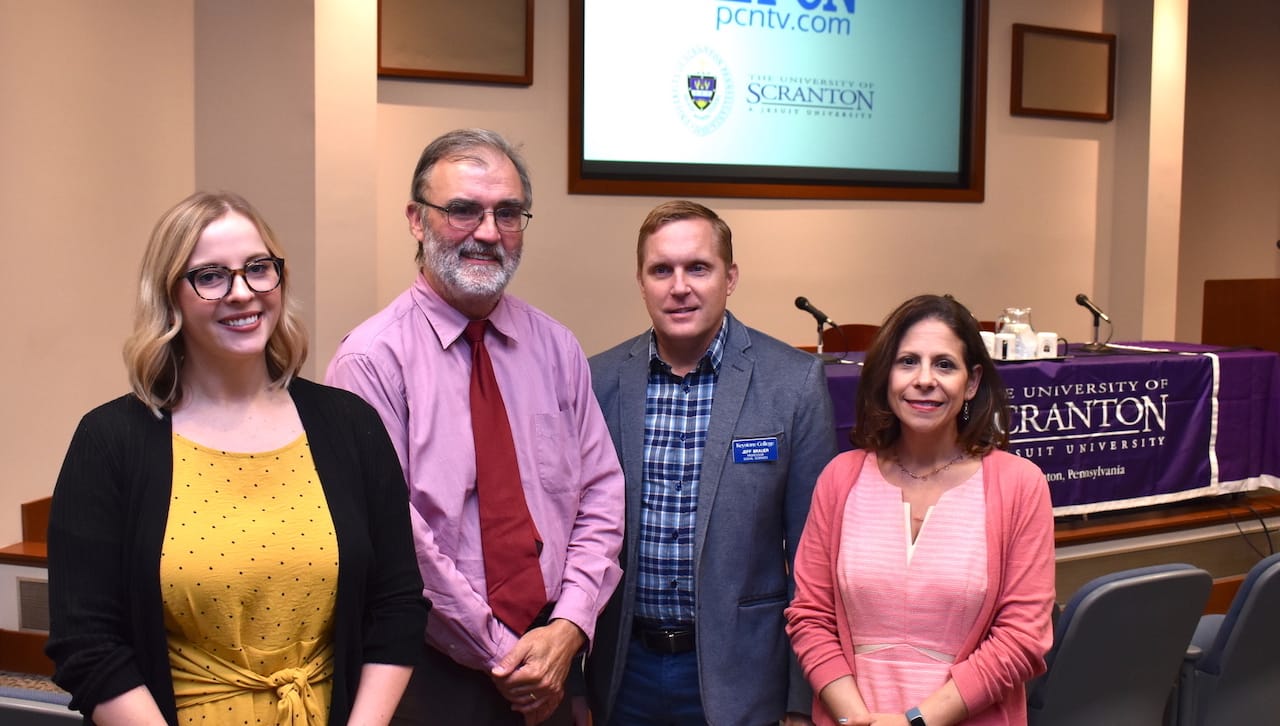University Hosts PA Cable Network Election Roundtable

The University of Scranton recently hosted a Pennsylvania Cable Network (PCN) “On the Road” College Election Roundtable to discuss the highly contested Pennsylvania Governor and U.S. Senate races. Panelists for the event, co-sponsored by the University of Scranton’s Political Science Department, were JoyAnna Hopper, Ph.D., director of The University of Scranton’s Center for Ethics and Excellence in Public Service; Jeff Brauer, professor of social and behavioral sciences at Keystone College and University of Scranton alumnus; and Borys Krawczeniuk, investigative reporter for the Scranton Times-Tribune. Francine Schertzer, senior vice president and chief content officer for PCN, moderated the discussion.
Several questions posed to the panel sought to determine what salient issues will likely motivate citizens to vote, and how specific candidate attributes will affect the election outcomes.
Prof. Brauer highlighted the struggling economy as an important factor that will drive people to vote. Dr. Hopper agreed, but expanded, noting that some polls find the issue of abortion, a topic of intense conversation since the Supreme Court overturned Roe v. Wade with the Dobbs v. Jackson decision in June 2022, to be of larger importance to voters than the economy and inflation. She also referenced Kansas voters’ rejection of a referendum that would have restricted abortion rights as evidence that this issue may bring more women and independents to the polls in favor of Democrats.
Other questions examined if the panel expected the Pennsylvania midterms to defy typical midterm election expectations. For example, after successful primaries, candidates usually shift their rhetoric more to the center of the political spectrum to attract more voters. The party opposite of the president also tends to win more seats in midterm elections. Krawczeniuk responded, explaining that Fetterman, Oz (candidates for the U.S. Senate), and Shapiro (Democratic candidate for Pennsylvania Governor) have all moved their positions closer to the middle, but Doug Mastriano, the Republican candidate for Governor, has not. Dr. Hopper attributed this to a recent trend in which candidates are being “rewarded for being on the extremes.” Krawczeniuk also pointed out that although early data pointed to voters favoring Republican candidates, the Democratic candidates have since taken the lead in the polls. However, Krawczeniuk expects the polls to tighten as they usually do after Labor Day.
Dr. Hopper said that the relevance and influence of a former president (Donald Trump) this long after the conclusion of their term is not typical, but will likely have an effect on the midterm results. Prof. Brauer noted that although midterm elections typically act as a referendum on the president’s party, this election still seems to focus on, in a way, the choice between two presidential candidates – a notion exemplified recently as both President Biden and former President Trump visited Northeast Pennsylvania. Dr. Hopper underscores that the state garners so much attention because “Pennsylvania, I think, it is really truly split.”
The panelists also fielded questions about the importance of debates, social media and endorsements and discussed each of the candidates more specifically.
The panelists concluded the event with advice on how to identify legitimate polls, highlighting the importance of poll timing, poll sample-size, the poll’s margin of error, the poll’s potential partisan leaning and the importance of referencing several different sources. The panelists also noted that polls tend to become more accurate the closer to the election.
The panel discussion can be viewed on PCN’s website.







